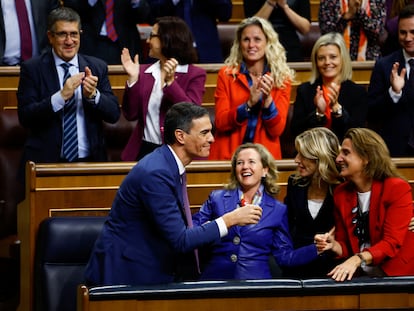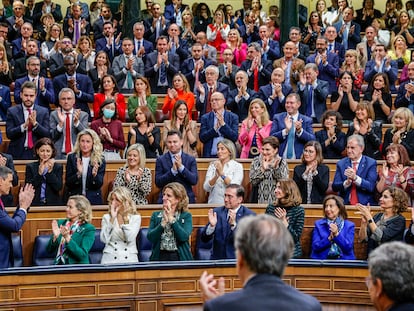Pedro Sánchez, the political survivor who keeps resisting against all odds
In 10 years, the Socialist leader went from complete obscurity to the prime minister’s chair for what might soon become the second-longest term in office of Spanish democracy


It took him a long time to get them to take him seriously. Ten years ago, when Pedro Sánchez decided to try his luck in the Spanish Socialist Party (PSOE) primaries, and he began to tell his close circle about it, not even some of his close friends who are now in La Moncloa, the seat of government, thought he had a chance. Some even advised against it. No one knew him within the party, he had no organic weight, it seemed impossible that he could become general secretary.
A decade later, with several failures, recoveries, repeat elections and unexpected successes behind him, Sánchez is one of the most powerful men in the history of the PSOE, as even the most critical veterans admit. He faces almost no internal criticism and on Friday he will take office for the third time as prime minister of Spain, after having managed to win an investiture vote inside parliament with 179 votes, more than the previous ones, and with broad cross-party support. If we add all the parties that have backed him — PSOE, Sumar, Catalan Republican Left (ERC), Junts, Bildu, Basque Nationalist Party (PNV), Galicia Nationalist Bloc (BNG), Canaries Coalition (CC) — there are 12.6 million votes behind the new progressive government. In the history of Spanish democracy, only José Luis Rodríguez Zapatero had more votes backing his investiture: 13.5 million, in 2004. Against all odds, as always, Sánchez continues to break records and add chapters to his Resistance Manual, the title of the only book he has written so far.
With a frantically paced political career, always at the limit, with resounding failures such as his resignation as party secretary general in 2016 because he refused to abstain to allow the investiture of opposition leader Mariano Rajoy of the Popular Party (PP), and epic comebacks such as the new primaries of 2017, with tough electoral defeats like those of 2016 and very clear victories like the two in 2019, Sánchez has been gradually expanding his support and achieving the political respect that he did not have at the beginning and which, after five years in power, no one denies him anymore. Not even Alberto Núñez Feijóo, president of the PP, who believed that he could easily defeat him at the polls simply by surfing the anti-Sánchez sentiment that had given the conservatives victories in regional elections in June. Instead, at the July 23 national election, he found himself up against a tough Sánchez who obtained a million more votes than in 2019, condemning the PP leader to the opposition. Feijóo clearly shows his deep rejection of Sánchez, but at least he admits in Congress that he has “a legitimate majority,” which is an indirect way of acknowledging the leader who achieved it, even if it was in exchange for an amnesty that the PP rejects outright.
Sánchez, his people say, has unwavering faith in his own success. He had it in 2016, when after a very bad showing he attempted an investiture deal with the center-right Ciudadanos that finally failed and led to new elections, with even worse results for the left, paving the way for a weak government headed by the PP’s Mariano Rajoy. Sánchez took the opportunity to file a no-confidence vote against Rajoy in 2018 that seemed almost impossible, just a week after the PNV had supported Rajoy’s budget, but it finally turned out to be the first successful no-confidence vote in Spanish democracy. He had faith when, in 2019, he was convinced that he would be able to force Podemos leader Pablo Iglesias to let him govern alone. And also when he took the country to a repeat election, believing he could make a clean sweep thanks to part of the Ciudadanos vote, something that never happened. He took another risk after seeing the outcome of the repeat election, where he fared worse than expected, and quickly opted to form the first coalition since the 1930s and seek an agreement with ERC, even with its leader in jail over the failed secession attempt of 2017. “No one would bet a dime on us back then,” he would say later, in a phrase that he often uses. The analysts said that Sánchez would not last long with such a limited majority, but he practically finished his term in office, getting three budgets and more than 200 laws approved. And again, after a bad result in the municipal elections, he decided to gamble it all the next day by calling an early general election for July 23.
Most pollsters told him that he had no chance of remaining in La Moncloa. It seemed like his fate had been sealed. Feijóo’s entourage even predicted that the PP would reach 168 seats, close to the absolute majority. But Sánchez appealed to the country’s progressive majority, asking them to mobilize to prevent a PP government with the far-right Vox, which would make its leader, Santiago Abascal, the deputy prime minister of Spain. And that majority once again went to the polls at much higher rates than expected, which compensated for the also extraordinary mobilization of the right, until the two large blocs were practically in a tie — there were only 300,000 additional votes in favor of PP-Vox against the PSOE. That tie has been broken by the nationalist and pro-independence voters, more than 1.5 million of them, who have chosen to give power back to Sánchez.
To achieve this, the prime minister has performed a significant change of tack, not only by accepting the amnesty that he had always rejected before this, but because he has accepted that this political term will have to be very focused on the territorial debate, and that he will have to open up to difficult negotiations with the separatists — the Catalans but also with the Basque nationalists who want a new regional charter. In fact, on the last day of the investiture debate in Congress, shortly before voting, Sánchez spoke about “interpreting the Constitution in accordance with the current spirit of the times.” A constitutional reform is unfeasible, because it would require an impossible agreement with the PP, so Sánchez is choosing to move in the only wiggle room that is left: the margin of interpretation of the Constitution.
That idea of the zeitgeist is an almost perfect summary of Sánchez’s own political career and his way of coming to power and continuing in it. The leader of the PSOE adapts to the times, he has made a political style out of pragmatism and the ability to rectify his positions, in a way that is criticized by the opposition as much as it is defended by his own side. But above anything else, Sánchez always manages to extricate himself from every labyrinth, including the last one, the most difficult of all, because inside it was Junts and its unpredictable leader, Carles Puigdemont, with whom it seemed impossible to reach an agreement, yet it has been achieved. If all goes well, Sánchez will be able to spend four more years in La Moncloa. His team is convinced that, once again, they will break all the forecasts and achieve the necessary stability to last the full term. If they succeed, Sánchez would be at the helm of the government for at least nine years, making it the second-longest term in office after Felipe González, who spent 14 years as prime minister. An unthinkable record for Sánchez when he began his adventure 10 years ago. But, given his career, no one sees it as impossible anymore.
Sign up for our weekly newsletter to get more English-language news coverage from EL PAÍS USA Edition
Tu suscripción se está usando en otro dispositivo
¿Quieres añadir otro usuario a tu suscripción?
Si continúas leyendo en este dispositivo, no se podrá leer en el otro.
FlechaTu suscripción se está usando en otro dispositivo y solo puedes acceder a EL PAÍS desde un dispositivo a la vez.
Si quieres compartir tu cuenta, cambia tu suscripción a la modalidad Premium, así podrás añadir otro usuario. Cada uno accederá con su propia cuenta de email, lo que os permitirá personalizar vuestra experiencia en EL PAÍS.
En el caso de no saber quién está usando tu cuenta, te recomendamos cambiar tu contraseña aquí.
Si decides continuar compartiendo tu cuenta, este mensaje se mostrará en tu dispositivo y en el de la otra persona que está usando tu cuenta de forma indefinida, afectando a tu experiencia de lectura. Puedes consultar aquí los términos y condiciones de la suscripción digital.









































